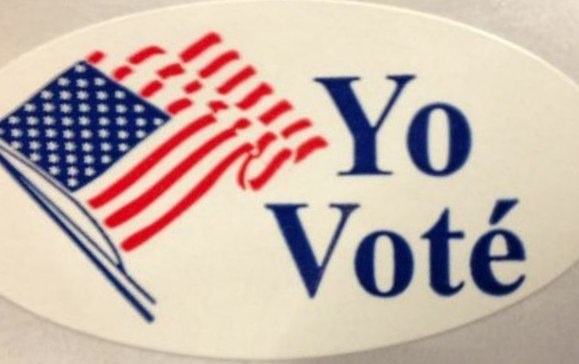Latinos flex their political muscle in South's early vote

A sticker reads "I voted" in Spanish. Latino voter turnout in the South during early voting this year has been stronger than in recent elections. (Photo by sarachicad via Flickr.)
Given the growing number of Latino voters, combined with their opposition to Republican presidential nominee Donald Trump's anti-immigrant rhetoric, there's been speculation about whether this voting bloc would be a force to be reckoned with in the 2016 election.
Early voting numbers so far suggest it is.
In states across the South and nationwide, Latino early voting rates have surpassed 2012 levels. Latino Decisions, a national polling firm, projects overall Latino turnout in 2016 will hit a record high nationwide with up to 14.7 million Latinos casting ballots.
Texas, a majority people of color state with a large Latino population, has seen dramatically higher early voting rates this year, with rates in the state's most populous counties surpassing those of 2012 and 2008. After just one week of early voting, Latino voter turnout in three Texas counties with the highest share of Latinos had exceeded 80 percent of 2012 levels.
A similar story is playing out in the battleground state of Florida, where Latinos voters now make up 15.6 percent of Florida's electorate, up 2 percentage points from 2012. They account for 14.2 percent of all early voters in Florida so far in 2016, according to University of Florida professor Daniel Smith. That compares to 9.9 percent in 2012.
A New York Times analysis of early voting numbers as of a week before Election Day found that the share of Latinos among early voters also increased in Georgia, North Carolina and Virginia.
Latino turnout is increasing in a year when black turnout in early voting has been down in many of these same states. Black voters make up a substantial share of the electorate in Southern states, and their record turnout rates in 2008 and 2012 helped propel President Obama to victory. It remains to be seen whether higher Latino turnout in 2016 will make the difference in states like North Carolina and Florida, where the presidential race is projected to be decided by a 0.1 percent or smaller margin.
But while the data suggests the number of Latino voters is growing, Latino voter engagement shouldn't be taken for granted in the future — especially in years where polarizing candidates like Donald Trump aren't at the top of the ticket.
Increasing outreach to Latino voters in Southern states will be essential. Polling from Latino Decisions found that 7 in 10 Latino voters in Texas hadn't been contacted about voting this election by a political party or other organization. In North Carolina, over half — 55 percent — had not been contacted.
Furthermore, the Latino electorate in the South is disproportionately made up of young voters — a demographic that tends to vote less often than older voters and whose turnout levels during early voting this year have been down compared to four years ago. Today, nearly half of the Latino electorate in Southern states are millennials between the ages of 18 and 33, and an estimated 1 million more young Latinos are projected to turn 18 and become eligible to vote by 2020.
Whether those young voters feel compelled to show up to the polls will be critical for the Latino electorate to build on the momentum generated in 2016.
Tags
Allie Yee
Allie is a research fellow at the Institute for Southern Studies and is currently studying at the Yale School of Management. Her research focuses on demographic change, immigration, voting and civic engagement.
